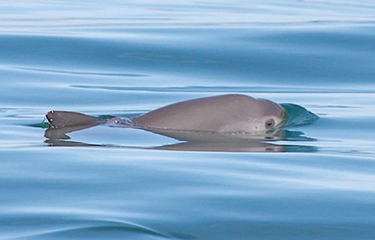International Whaling Commission issues extinction alert for vaquita porpoise

The International Whaling Commission (IWC) has warned the critically endangered vaquita porpoise will likely disappear from the earth if immediate action isn’t taken to save it from extinction.
Just 10 to 13 individual vaquita remain alive, all in the Northern Gulf of California in Mexico, down from 570 in 1997, according to a survey released in June 2023.
The IWC was created in 1946 as a global body responsible for managing the conservation of whales and other cetaceans, including porpoises. On 7 August, the IWC Scientific Committee issued its first-ever extinction alert for the vaquita, a mechanism created to “encourage wider recognition of the warning signs of impending extinctions, and to generate support and encouragement at every level for the actions needed now to save the vaquita,” according to the group.
“The decline of the vaquita has continued despite a very clear understanding of both the cause (bycatch in gillnets) and the solution (replacement of gillnets with safe alternatives in the vaquita habitat),” the warning said. “This number appears to have remained fairly constant since 2018, probably due to increased enforcement of gillnet bans and removal of nets. But this effort needs to be 100 percent effective to start reversing the decline and bringing the vaquita back from the brink of extinction. An illegal, international trade in totoaba fish, found in the same waters, has complicated efforts to end gillnet fishing. Despite nearly 30 years of repeated warnings, the vaquita hovers on the edge of extinction due to gillnet entanglement.”
On 30 May, a ruling from the U.S. Fish and Wildlife Service that Mexico is not doing enough to protect the vaquita forced U.S. President Joe Biden to make a determination whether to impose an embargo on Mexican imports. On 18 July, Biden decided not to issue an embargo, calling instead for high-level dialogue between the U.S. and Mexico on protecting the totoaba and vaquita.
The move by U.S. Fish and Wildlife followed-up an earlier announcement by the Secretariat to the Convention on International Trade in Endangered Species of Wild Fauna and Flora (CITES), which issued sanctions against Mexico for its failure to take action to protect the porpoise. CITES later lifted the sanctions after it met with government of Mexico to create a plan to protect the species.
The IWC Scientific Committee, comprised of 200 leading marine scientists, said the plight of the vaquita is evidence of the “need for early and multi-disciplinary actions that look beyond the immediate conservation concern to address wider factors.”
“But today their focus is the clear, single action needed now to save the vaquita,” it said. “The extinction of the vaquita is inevitable unless 100 percent of gillnets are substituted immediately with alternative fishing gears that protect the vaquita and the livelihoods of fishers. If this doesn’t happen now, it will be too late.”
Photo courtesy of Thomas A Jefferson/Viva Vaquita






Share